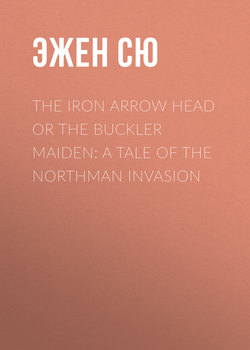Читать книгу The Iron Arrow Head or The Buckler Maiden: A Tale of the Northman Invasion - Эжен Сю - Страница 1
ОглавлениеTRANSLATOR'S PREFACE
The invasion of the Normans, or Northmen, or Norsemen – called throughout this brilliant story the Northmans – bears characteristics that distinguish it markedly from all the other European invasions. With all the others the migrations were brought on by home changes of soil and waterways that drove the invaders westward. War was only a means, the goal was bread. With the Northman invasion it was otherwise. The goal was war and adventure. This simple circumstance places a wholly different stamp upon the Northman invaders. It explains the impulse they gave to oratory, poetry, music and the fine arts. Their rush from the frozen north through Europe – conquering and transforming England; carving for themselves large domains out of the French territory, then held in the imbecile hands of the imbecile successors of Charlemagne; startling the populations of southern Italy and Sicily – acted like a leaven through all the territories that they traversed. And they traversed none without raising its tone with their poetic-barbarian spirit.
This story, the tenth of the Eugene Sue series "The Mysteries of the People; or, History of a Proletarian Family Across the Ages," is a matchless sketch of the Northman. It reproduces his uncouthness illumined with his brilliant latent qualities. The characteristics of the Northman invader have for their setting the physical and intellectual dullness of the Frankish conquerors of Gaul. The clash of the two reproduces a historic picture, or a page of history, that is unique.
The fears entertained by Charlemagne and expressed in the preceding story – "The Carlovingian Coins; or, The Daughters of Charlemagne" – are verified in this. A race of bold and adventurous invaders steps upon the scene of France, shocking the ruling class, arousing the ruled, and introducing a fresh breath into the land.
The Northman invasion of France reads, even in the driest work of history, like a rollicking Norse tale. That spirit is preserved in this charming historic novel, which is as instructive as it is entertaining, and in which again a descendant of the conquered race of Joel witnesses the degradation of the second royal house of France preparatorily to the witnessing, a few generations later, by another descendant of Joel, of the downfall of that second dynasty and the rise of the third, narrated in the following story, "The Infant's Skull; or, The End of the World."
DANIEL DE LEON.
New York, July, 1908.
